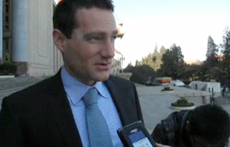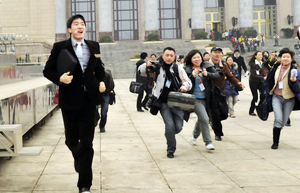CPPCC member: Beware of English invasion
By Wang Jingqiong (China Daily)
Updated: 2010-03-10 07:58
Preventive measures needed to preserve purity of Chinese
BEIJING: With more and more publications mixing Chinese with English, measures and regulations should be adopted to avoid English invading Chinese, suggested Huang Youyi, director of the China International Publishing Group.
| ||||
Highlighting the danger of Chinese culture becoming diluted and assimilated if the process continues, he warned: "In the long run, Chinese will lose its role as an independent linguistic system for passing on information and expressing human feelings."
Huang was referring to a popular phenomenon in China, in which English words are interwoven in articles and conversations.
For example, abbreviations such as GDP (gross domestic product), CEO (chief executive officer), CPI (consumer price index) regularly feature in publications.
Clarifying his stance, Huang said he was not only referring to the use of technical terms, but to the appearance of English names, places, people and companies in newspapers and other printed publications.
Recommending that translations be used instead, he said: "You rarely see Chinese characters in any English newspaper. They use pinyin, instead of Chinese characters.
"I'm not against using borrowed words," he added, "but they must be translated, either by their sounds or their meaning, into our native language, which is Chinese characters, or else Chinese have to learn English to understand what they read."
In his proposal to the annual session of the CPPCC National Committee, Huang made three suggestions to prevent what he considers to be "endangering the Chinese language".
First, all documents and speeches of top government officials should be written in pure Chinese, without the use of GDP, WTO or CPI.
Second, a law or regulation should be made as a guideline for the use of foreign words in publications.
Third, a national translation committee should be organized to translate foreign names and technical terms, which can then be published on a website.
Acknowledging that people increasingly like to mingle languages, Huang said:"Some of our people mistake using foreign words as being open minded and international. I don't think so.
"Instead, we should have confidence in our own language. You cannot expect others to respect you unless you respect yourself first. So, too, your language."
Explaining to China Daily why he worries about the English "invasion", Huang said: "As one of the most ancient languages, Chinese is now used primarily by the 1.3 billion Chinese people and it is defined by the International Federation of Translators (FIT) as a 'language of limited diffusion', as it is not influential or widely used outside the Chinese community."
While agreeing that every nation, and its people, should try to protect the purity of its own language, other experts argue that an absolute separation is neither practical or necessary.
Cai Jianfeneditor-in-chief of the Foreign Language Teaching and Research Press, also said that official publications should try to use pure Chinese as much as possible, while people should be allowed more freedom for informal occasions and works.
"I understand the worry that cultures and languages would be assimilated with globalization going on, which is already happening, yet I believe that people in general, or even writers, should be given more freedom to make their own choices", Cai told China Daily.
"It might be controversial, but language is alive. The Chinese we use today is a product of historical development and assimilation. We should trust the vitality of it," he added.






